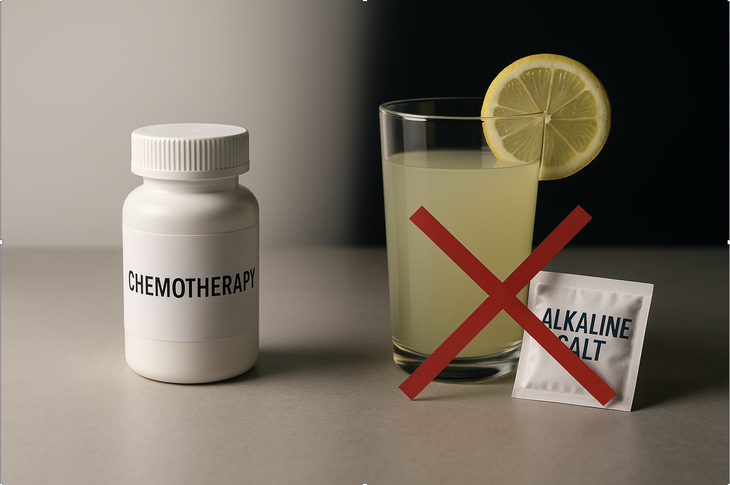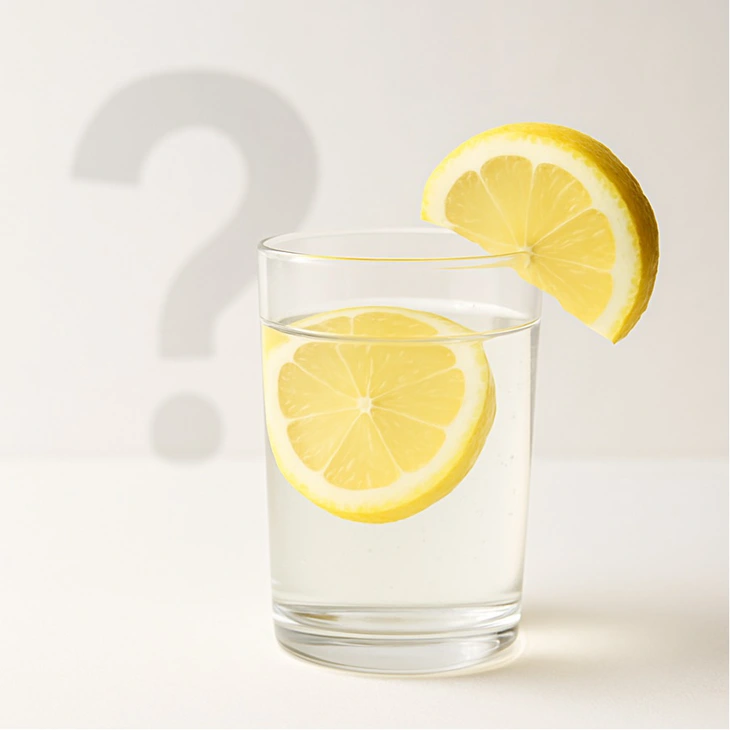
Misinformation about alkaline diets can cause patients to delay treatment, leading to faster disease progression and making it more difficult to control.
Scientific evidence suggests the opposite, and believing this could cost patients their chance of survival.
Misconceptions stemming from the Warburg effect.
"Cancer cannot survive in an alkaline environment, so drink alkaline lemon water and salt every day!", this seemingly scientific statement is spreading widely on social media and in some natural healing communities.
However, what modern science has proven is quite different: your body cannot be "alkalized" in that way, and cancer cannot be eliminated so easily.
The Warburg effect is a biological concept describing the phenomenon where cancer cells switch to consuming glucose through glycolysis even when sufficient oxygen is present.
This produces more lactate, causing the environment around the tumor to become acidic (pH drops to around 6.5-6.9, while healthy tissue is 7.4).
From this, some people interpret that "an acidic environment causes cancer," and then deduce that simply "alkalizing the body" can prevent or cure the disease.
But this is a fundamental mistake: confusing cause and effect. An acidic environment is a consequence of abnormal metabolism in cancer cells, not the cause of cancer.
Your body won't allow you to "alkalize your blood."
One of the reasons the "alkaline diet cures cancer" theory has fallen apart is because the human body has an extremely stable blood pH system. No matter what you eat or drink, your blood always stays within the pH range of 7.35-7.45 thanks to these regulating systems:
Bicarbonate buffer system : immediately neutralizes any small pH changes. Lungs : control CO₂ levels – a determining factor in blood acidity/alkalinity. Kidneys : long-term processing by eliminating excess H⁺ ions or reabsorbing bicarbonate.
Any attempts to "alkalize the blood" through food are immediately neutralized by these mechanisms. What you can change is the pH of your urine—not your blood.
If you consume too much alkaline, your body will excrete it. If this exceeds your capacity, you may develop metabolic alkalosis – a dangerous condition that can lead to seizures, cardiac arrhythmias, or coma.

Pursuing unproven therapies for cancer treatment can cause patients to miss out on proven treatments and lose their chance of survival.
Lemon juice and alkaline salt are useless?
Despite its acidic nature, lemon juice is often promoted as "post-metabolic alkalizing." However, the amount of bicarbonate produced after absorption is very small and does not affect the body's pH.
Several laboratory studies have noted that flavonoids in lemons may kill cancer cells.
However, this is only true when using extremely high concentrations, many times higher than when you drink lemon water. There is no evidence that drinking lemon water helps cure cancer in humans.
Some preclinical studies involving direct injection of bicarbonate into mice have shown effectiveness in reducing the acidity of the tumor environment. However, this does not mean that ingesting alkaline salts is safe or effective.
In humans, ingesting high doses of bicarbonate can cause electrolyte disturbances, hypernatremia, alkalosis, and renal failure. To date, no randomized clinical trials have demonstrated that ingesting alkaline salts cures cancer.
When patients believe in "natural" therapies and reject conventional treatments such as chemotherapy, radiation therapy, or immunotherapy, their chances of survival decrease significantly.
Misinformation about alkaline diets can cause patients to delay treatment, leading to faster disease progression and making it more difficult to control.
A systematic review by the Fenton group (University of Calgary, 2016) confirmed that there is no evidence to suggest that alkaline diets help prevent or treat cancer. Even a link between dietary acid load and cancer does not exist.
There are no shortcuts to curing cancer. The human body cannot be "alkalized" simply by drinking lemon water or alkaline salt.
Worse still, pursuing these unproven therapies can cause patients to miss out on proven treatments and lose their chance of survival.
So, is drinking lemon water advisable?
Drinking lemon water can still be beneficial, but not for "alkalizing" reasons. The vitamin C in lemons is a good antioxidant, helping to support immunity. Lemons also enhance the flavor of drinks and encourage the habit of drinking enough water every day.
However, you shouldn't drink too much pure lemon juice as it can harm your tooth enamel and stomach. And most importantly: never consider lemon juice as a "cure," especially for cancer.
Dr. Nguyen Cao Luan (born in 1990) is a PhD in Immunotherapy who graduated from the Lowy Cancer Research Centre, University of New South Wales (UNSW), Sydney, Australia.
He is a co-founder of Purple Ribbon, a pioneering non-profit organization in cancer prevention in Vietnam.
He is also the co-author of five publications released by the organization to date, including: the book Cancer: Rumors & Facts (May 2019), the four-volume illustrated book series Healthy Lifestyle - Cancer Prevention (June 2018), the Happy Hormones Handbook (2017), and desk calendars for 2017 and 2019 providing knowledge on cancer prevention.
Source: https://tuoitre.vn/che-do-an-kiem-co-chua-duoc-ung-thu-20250618092943898.htm




![[Photo] National Assembly Chairman Tran Thanh Man working with the Hai Phong City Election Committee](https://vphoto.vietnam.vn/thumb/1200x675/vietnam/resource/IMAGE/2026/02/26/1772103806795_ndo_br_bnd-8224-jpg.webp)

![[Photo] National Assembly Chairman Tran Thanh Man inspects election preparations in Hai Phong city.](https://vphoto.vietnam.vn/thumb/1200x675/vietnam/resource/IMAGE/2026/02/26/1772095420401_ndo_br_bnd-8016-jpg.webp)

![[Photo] Thousands of tourists visit the Quang Trung Emperor Temple in Nghe An during the early spring season.](https://vphoto.vietnam.vn/thumb/1200x675/vietnam/resource/IMAGE/2026/02/26/1772095410680_img-9305-3882-jpg.webp)








































































































Comment (0)